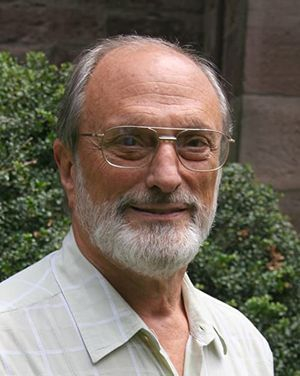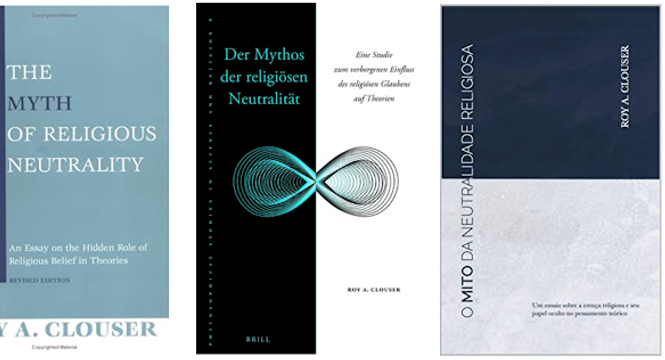
Roy Clouser is a professor of philosophy and religion (Emeritus) at the College of New Jersey. He holds a BA from Gordon College, a B.D. from Reformed Episcopal Seminary, and an MA and PhD from the University of Pennsylvania. Along the way to the PhD he studied with Paul Tillich at Harvard Graduate School and with Herman Dooyeweerd at the Free University of Amsterdam. In 1997 he won one of the Templeton Awards for his course in science and religion. He is the author of The Myth of Religious Neutrality (University of Notre Dame Press, revised 2005), Knowing with the Heart (IVP, 1999), and numerous articles.
A summary of Roy’s work is available in Portuguese:
Guilherme de Carvalho 2016. Teísmo Cristão e Ciência: o pensamento de Roy Clouser.
Originally published in the annals of the 2005 ALER Symposium.
On Clouser
Bruce Wearne 2009. Philosophy as Dependable Analysis: Roy Clouser’s Contribution to Christian Scholarship. Bristol: All of Life Redeemed.
Bruce Wearne 2018. Contributions to the WdW.
Articles
2021. Three Theological Arguments in Support of Carol Hill’s Reading of the Historicity of Genesis and Original Sin. Perspectives on Science and Christian Faith 73(3).
2021. The idea of Christian Philosophy
2016. “Reading Genesis” Perspectives on Science and Christian Faith 68(4).
2014. “Can we know God is real?”, Koers – Bulletin for Christian Scholarship 79(1), Art. #447.
2012. “Review of Alvin Plantinga’s Conflict” Perspectives on Science and Christian Faith 64 (3) September.
2012. “Pancreationism: the fall of theology” In The Presence of God in Orthodoxy: Divine Essence and Divine Energies (Cambridge: Thomas James).
2011. “A reply to J. Glenn Friessen” Philosophia Reformata 76.
2009. “A New Philosophical Guide for the Sciences: Ontology Without Reduction” The Global Spiral (Journal of the Metanexus Institute) Vol. 10
2009. “A Brief Sketch of the Philosophy of Herman Dooyeweerd” Axiomathes (Journal of the Mitteleuropa Foundation). (Updated 2019)
2009. Editorial with Danie Strauss Axiomathes DOI 10.1007/s10516-009-9094-z
2009. “Transcendental Critique Revisited and Revised” Philosophia Reformata Volume 74 (1)
2009. ‘Can we know God is real?’ Convocation address at Dordt College January 2009.
2008. Is belief in God made obsolete by science?
2008. A blue print for a non-reductionist theory of reality. Transdisciplinarity in Science and Religion, pp. 27-58. (Curtea Veche Publishing, Bucharest, Romania)
2007. A third view of rights and law: A critique of assumptions behind the Declaration and the Constitution
The 13th Annual Kuyper Lecture for 2007, Harvard Law School 18th October 2007
Sponsored by the Centre for Public Justice
2006. Genesis regained: creation not creationism Tydskrif vir Christelike Wetenskap/ Journal of Christian Scholarship (Spesiale Uitgawe 1)
Paper presented at the Templeton Science and Religion Conference June 2006, Philadelphia, Pennsylvania
2006. Prospects for Theistic Science. Perspectives on Science and Christian Faith, March 2006. [pdf]
Halvorson, Hans. Comments on Clouser Claims for Theistic Science, PSCF 58:1.
Le Morvan, Pierre. Clouser’s Definition of Religious Belief Itself Religiously Neutral PSCF 58:1
Ratzsch, Del. On Reducing Nearly Everything to Reductionism,PSCF 58: 1
Clouser, Roy Replies to the Comments of Le Morvan, Halvorson, and Ratzsch on Prospects for Theistic Science
Clouser, Roy. Author’s Reply to Two Letters Regarding Prospects for Theistic Science (PSCF58, no. 1 [2006]: 2-15; PSCF 58, no. 3 [2006]: 253-4; and PSCF 58, no. 3 [2006]: 254-5), 58:4, 333, D 2006.
2003. Reason and Belief in God. Philosophia Reformata, June.
2003. Is there a Christian view of Everything from Soup to Nuts?. Pro Rege, June, 2003.
2002. “Social norms and religious belief“
2001. Is Theism Compatible with Evolution?. In Intelligent Design Creationism and Its Critics: Philosophical, Theological, and Scientific Perspectives, Ed. Rob Pennock. (Cambridge: MIT Press, 2001), 513-536.
2001. Three Watersheds of Biblical Interpretation. In Marginal Resistance: Essays dedicated to John Vander Stelt (Dordt College Press, 2001)
2000. Post Christmas Reflection
1999. Is God Eternal? In The Rationality of Theism, Ed. A.G. Sienra. (Amsterdam/Atlanta: Rodopi Publishers, 1999), 273-299.
1999. Is the Death Penalty Viable? Capitol Commentary, October, 1999.
1999. Taking Aim at Gun Control. Capitol Commentary, August, 1999.
1998. Me? Major in Philosophy?
1997. A Critique of Historicism. Critica, vol. XXI/ No. 85, pp. 41-63, Mexico, Abril 1997.
1997. Hiroshima and Nagasaki. Capitol Commentary, August 1997.
1996. On the General Relation of Religion, Metaphysics, and Science. In Facets of Faith and Science, Ed. J. Van der Meer. (Lanham: University Press of America, 1996), vol.2, 57-80. [pdf]
1996. A Sketch of Dooyeweerd’s Philosophy of Science. In Facets of Faith and Science, Ed. J. Van der Meer. (Lanham: University Press of America, 1996), vol. 2, 81-98. [pdf]
1995. The Uniqueness of Dooyeweerd’s Program for Philosophy and Science: Whence the Difference? In Christian Philosophy at the Close of the 20th Century, Ed. Griffoen & Balk (Netherlands: Kampen, Kok, 1995), 113-125. [pdf]
1993. Interest Groups Dominate Congress. Public Justice Report, Sept 1993.
1992. Faith Tectonics. Elipses, (Princeton), spring, 1992.
1991. Genesis and Science on the Origin of the Human Race. Perspectives on Science and Christian Faith, Vol. 43, no.1, March 1991, pp. 2-13.
1991. Victory in the Gulf?. Editorial in the Public Justice Report, vol. 14, no. 10, Washington, DC, Sept.
1991. Review of Body, Soul, and Life Everlasting by John Cooper (Eerdmans Publishing Co., Grand Rapids, 1989) in The Westminster Theological Journal, vol. 53, no. 1, spring 1991.
1989. “Is There an American National Character”. The Public Justice Report, vol. 12, No. 7, April 1989
1989. Review of The Political Meaning of Christianity by Glenn Tinder (Louisiana State University Press, 1989) in the Public Justice Report, vol. 12, no. 7, March.
1988. Divine Accommodation: An Alternative Theory of Religious Language. Tijdskrif vir Christelike Wetenscap (Bloemfontein: Vereniging vir Christelike Hoer Onderwys, August, 1988), 94 -127. [pdf]
1985. Dooyeweerd on religion and faith: a response. ICS Conference paper.
A response to James Olthuis’s chapter in C T McIntire (ed.). 1985b. The Legacy of Herman Dooyeweerd: Reflections on Critical Philosophy in the Christian Tradition. University Press of America: Toronto.
1984. Review of The Challenge of Marxist and NeoMarxist Ideology for Christian Scholarship. Ed. John Vander Stelt, in The Westminster Theological Journal, vol. LXVI, pp. 161 – 163, spring 1984.
1983. Religious Language: A New Look at an Old Problem. In Rationality in the Calvinian Tradition, Ed. Hart, Van derHoeven, & Wolterstorff. (Lanham: University Press of America, 1983), pp. 385ff.
1981. Four Options in the Philosophy of Religion. Anakainosis (Toronto) April.
1980. A Critique of Descartes and Heisenberg. Philosophia Reformata. (Amsterdam: Fall, 1980), 157.
1979. Puritanism on Authority. Anakainosis, (Toronto), June 1979.
1968. Aristotle’s Theory of Incontinence. Philosophia Reformata, (Amsterdam: Spring, 1968), 90-99.
Books
Forthcoming. Can We KNOW God Is Real?

The Myth of Religious Neutrality: An Essay on the Hidden Role of Religious Beliefs (University of Notre Dame Press: Notre Dame, 1991; 2nd edn 2005)
Korean, Portuguese and German translations are available, and a Spanish version is to appear soon.
The central claim of the book is that all theories of science and philosophy presuppose something as divine and are, in that sens,e religiously regulated. The divinity belief presupposed internally regulates theories in that the interpretation of the nature of their postulated entities varies relative to the nature of the divinity presupposed. This sort of internal regulation is not just socio-cultural influence, but arises from the very activity of theory formation and so is universal and unavoidable. The influence of religious belief is thus deeper and more pervasive than the prevailing view that theories need only be externally harmonized with particular religious tenets.
To make clear exactly how such theory-regulation works, there are case studies of the most influential theories in mathematics, physics, and psychology. Principles are then developed to show how this same sort of regulation can be brought to theories when the controlling presupposition is belief in God.
This idea of a uniquely Christian-theistic philosophy and science is derived from the work of the Dutch Calvinist philosopher Herman Dooyeweerd (1894-1977). On his view the most important way belief in God regulates theories is by requiring them to presuppose a radically nonreductionist ontology, and he constructed just such a theory. The book closes with an introduction to that ontology and to some of its consequences for the social sciences including political theory.
The book was nominated for the American Academy of Religion’s Excellence Award and for the Grawemeyer Award in Religion. A second (revised) English edition appeared in the spring of 2005.

Knowing with the Heart: Religious Experience and Belief in God (Downers Grove: InterVarsity Press, 1999; 2nd edn Wipf and Stock, 2007 )
The subject is the epistemic status of belief in God, and I side with the non-evidentialists by holding that belief in God is both produced and justified by religious experience.
The traditional classifications of religious experience are examined, critiqued, and their common core identified. The question is then raised as to whether any of them can justify, as well as generate, belief in God. This is tackled by first setting the question in a wider epistemological context and asking whether there are experiences of any kind that can justify the beliefs they produce. The prevailing answer in philosophy has been ‘yes’: normal sense perception and the experience of self-evidency have long been accepted as justificatory. I focus on self-evidency.
A descriptive analysis of the experience of self-evidency shows that the traditional restrictions on it are incoherent, and that once these are eliminated self-evidency is indistinguishable from what was identified as the common element in all the types of genuine religious experience. I conclude that genuine religious experience is therefore a species of (the experience of) self-evidency, and carries the same epistemic warrant.
This claim is then tested against a number of traditional objections to belief in God, and justification by self-evidency is defended as unavoidable (contrary to pragmatism), reliable though not infallible (contrary to rationalism). A number of important consequences are then drawn for apologetics and comparative religion.
Audio recordings
These recordings of Roy Clouser are taken from the Wrestlers Class of National Presbyterian Church, 4101 Nebraska Avenue, NW, Washington, DC USA.
1. Reformed Theology and the Myth of Religious Neutrality (2 of 2)
[part 1 not recorded]
25 April 2010
http://www.christianmind.org/npc/wrestlers/details.asp?id=332
2. Can we Know that God is True?
15 May 2011
http://www.christianmind.org/npc/wrestlers/details.asp?id=366
3. The Idea of a Christian Philosophy
11 March 2012
http://www.christianmind.org/npc/wrestlers/details.asp?id=389
4. Grounds for Belief in God According to New Testament
18 March 2012
http://www.christianmind.org/resources/video/20120318_ClouserASA.html
5. Herman Dooyeweerd’s Theory of Reality
18 March 2012
http://www.christianmind.org/npc/wrestlers/details.asp?id=390
6.Understanding Early Genesis
8 December 2013
http://www.christianmind.org/npc/wrestlers/details.asp?id=437
7. What is Faith?
28 September 2014
http://www.christianmind.org/npc/wrestlers/details.asp?id=449
8. The Final Destiny of All People
6 December 2015
http://www.christianmind.org/npc/wrestlers/details.asp?id=480
9. One or Two Books of God?
21 May 2017
http://www.christianmind.org/npc/wrestlers/details.asp?id=517
Videos